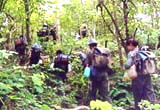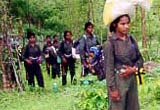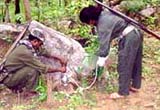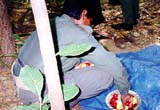

| Read from beginning |
 Up at 0530 hours after a miserable night. It was a false alarm. Though we hadn't had to flee, and had even got food, sleep was a commodity which none of us managed enough. The mosquito repellent failed me completely. And it was a sticky hot night to boot.
Up at 0530 hours after a miserable night. It was a false alarm. Though we hadn't had to flee, and had even got food, sleep was a commodity which none of us managed enough. The mosquito repellent failed me completely. And it was a sticky hot night to boot.
We are to trek to a safe place, about 40 minutes away, shortly. There we would stay for the next two days.
I learn something more about jungle life this morning: here everything, even an empty plastic bag, is invaluable.
Off to answer the second call of nature, I am handed my ration of water in a plastic bag. I walk into the bushes, clutching its mouth close and praying the water won't ooze out before I finish. Fortunately, it doesn't. But I commit a cardinal sin: I toss the bag away after I finish! The only excuse I can offer for my thoughtlessness is that I was somewhat hurried in my exercise by the undue interest of a cowherd, whose presence I discovered very, very late in the proceeding.
Vishwanath's face falls as I return empty-handed.
"Isse bina idhar kaam nahin chalta, bhaiyya (We can't do the job without this)," he tells me. Chastened, I walk back to the camp, promising myself never to be so stupid again.
The morning also teaches me another lesson: that it takes no effort to get lost in this jungle. You think you know where you are going, but you don't. On my way back after the unfortunate encounter, I wander off in a direction which I think is right -- and nearly stumble on G.
"Hey, where do you think you are going?" comes his panicked shout from behind some bushes, "The camp is that way!"
By 0630 hours, we are ready to start. We are a big procession. Karan starts a roll call and I find I am the 16th of the total 28.
 Today we are moving at a picnic pace, in respect of the seven 'patients', or sick members, we have, and the provisions we are carrying. Many of the guerrillas, besides their rucksacks and rifles, have an additional burden -- either balanced on their head, strapped on top of their backpacks or in their free hand.
Today we are moving at a picnic pace, in respect of the seven 'patients', or sick members, we have, and the provisions we are carrying. Many of the guerrillas, besides their rucksacks and rifles, have an additional burden -- either balanced on their head, strapped on top of their backpacks or in their free hand.
At 0715 hours, we stop for a 10-minute halt. As we wait to catch our breath, R asks whether there are any police pickets inside. Karan says there aren't, for the simple reason it would take a big contingent there -- at least 30 to 40 personnel -- if they are to defend it from guerrilla attacks.
"But they have enough informers among the villagers," he says, "Sometimes CIDs (personnel of the criminal investigation department) roam around pretending to be mad. We finished off three or four of them in 1992. Once we caught one who had his photograph in full uniform and ID card on him!"
We stop again a little later. I take it we have reached our destination. The guerrillas are scouting around, trying to find a clearing for the tents. H is busy clicking. I too remove my camera and get a couple of shots. From here, it is only four kilometres to the road. Yet, it looks secluded, secure.
No, I am wrong. We will not be camping here. After scrutinising the land, Karan decides it is not safe enough. Too vulnerable, he says, as we start moving. It's a climb uphill and we stop at the top. From here, you can see every point of approach.
As the camp settles in, we are asked whether we want breakfast first or a bath. We settle for breakfast and then a bath.
"Waisa hai to didilog abhi nahane jayenge (In that case, women members will go for a bath now)," Karan decides.
 All around guerrillas are spreading plastic sheets. I see Sitaakka laying out a white, thick wire to one end of the camp. Vishwanath tells me she is laying a Claymore mine. The mine is home-made, the explosives packed into a small tiffin box. There is a small hole underneath for the detonator. The wire leads right up to the camp from where, in case of an attack, it can be set off. The deadly tiffin-box is duly camouflaged with rocks and leaves.
All around guerrillas are spreading plastic sheets. I see Sitaakka laying out a white, thick wire to one end of the camp. Vishwanath tells me she is laying a Claymore mine. The mine is home-made, the explosives packed into a small tiffin box. There is a small hole underneath for the detonator. The wire leads right up to the camp from where, in case of an attack, it can be set off. The deadly tiffin-box is duly camouflaged with rocks and leaves.
As we wait for breakfast, which Taraakka is preparing a little away near a reluctantly-running stream, I ask Karan about the PW's structure. In each division, he tells me, there are 6 to 7 squad area committees. Each of the SACs would normally have a central guerrilla squad and one or two local squads. The commanders of all squads are SAC members, and so are the majority deputy commanders.
"To become a squad member you don't need political awareness, but to become a party member you certainly do," Karan says, "Anyone who's willing, is 16 years of age, has worked for any of our front organisations (like the Dandakaranya Adivasi Kisan Mazdoor Sangh and Krantikari Adivasi Mahila Sanghatan) for at least a year and has a good character is eligible. But for the party, you should believe in the revolution. You should have a certain level of political maturity. Yeh marg se jane se har revolution success ho jayega karke vishwas rahna chahiye. (They should believe that this is the right way and the revolution will succeed.)"
The number of women in the squads, Karan tells me, is quite high -- 33 per cent. In the last few years, they have risen in leadership too. DK, thus, has 30 women SAC members. Of this, four are central guerrilla squad commanders, 12 deputy commanders and one local guerrilla squad commander.
"Actually, there were two LGS commanders," Karan adds, "But one of them -- Kamalaakka -- got killed recently."
Despite physical limitations, the women comrades make as good guerrillas as the men. Sometimes better, because their loyalty to the party is much more than that of their male counterparts.
"Compared to the men, very few women leave the squads after joining," the Naxal says, "Once they are here, this becomes their home."
The conversation turns to married women. Would a woman with family be taken in if she is willing to join?
"If she's eligible, yes," Karan replies, "If she wants to leave her husband, then we will enquire about the reasons. If we find that the relation is not good for her, the party will sanction her divorce and recruit her. She may join the squad even without a divorce -- that we leave to her."
Marriages between squad members are very common. Karan himself is married to Sumitra, a dark, slim woman, who's part of Radhaakka's dalam.
"But starting a family is discouraged," he says, "This is the time of revolution. Not a good time to bring a child into the world. We try to make the members understand this and get them to go in for vasectomy or use condoms. But if they still want a child, they are free to go ahead."
We talk till it is breakfast time. Karan picks up his SLR, dons his ammunition jacket, and I follow him down the steep, rocky path to the stream. Taraakka is serving chivida (a mixture of puffed rice, peanuts and onions) and hot, sweet tea.
As we eat, H and G make good-natured fun of my constant scribbling. "Don't take so many notes," G advises, "For one, I find that too much notes confuses me. Two, you stop enjoying the trip."
I tell him about my editor's expectation of me -- I am to bring home at least 8,000 words -- and his horror for half-baked, detail-less stories.
 An hour later, it is bathing time. Finally! But bathing is not jumping into the water here. The guerrillas are careful to keep their small pool clean. So they make tiny individual pools for all of us by spreading plastic sheets and blocking its sides with stones placed underneath. Water is filled in, and we set to do our most urgent laundry.
An hour later, it is bathing time. Finally! But bathing is not jumping into the water here. The guerrillas are careful to keep their small pool clean. So they make tiny individual pools for all of us by spreading plastic sheets and blocking its sides with stones placed underneath. Water is filled in, and we set to do our most urgent laundry.
The guerrillas are provided a Lifebuoy soap and half a slab of detergent, Rin, every month. The women, in addition to this, get a Detol soap -- the only allowance which the PW makes for their monthly cycle.
On the way back to the camp, I stop to talk to Taradidi. She is busy with preparations for lunch, but offers me tea anyway. She has been with the movement for 11 years and is one of the first women guerrillas in DK. Now the deputy commander of a squad, she used to work on a farm earlier.
"The party people used to come to our village. Acche log hain (They are good people)... They told us how the world works, about exploitation. They were doing good work. So I also joined," she says.
Now she tots a .303 rifle, which, incidentally, is almost as tall as she. She has seen two ambushes and three encounters. But surprisingly, Taradidi, despite her long years in the jungle, has not killed anyone.
"Moka nahi mila, na (Never got the chance)," she says, answering my surprise, "Moka milega tho (If I get a chance)..."
A guerrilla comes to tell me Karan and the others are waiting, that they are about to start the briefing. Today, Karan is to talk about the history of the movement and the repression in DK, especially in Gadchiroli. And the whole of tomorrow is for questions. The plan, however, is to change drastically, but I have no inkling of it as I walk up to join in.